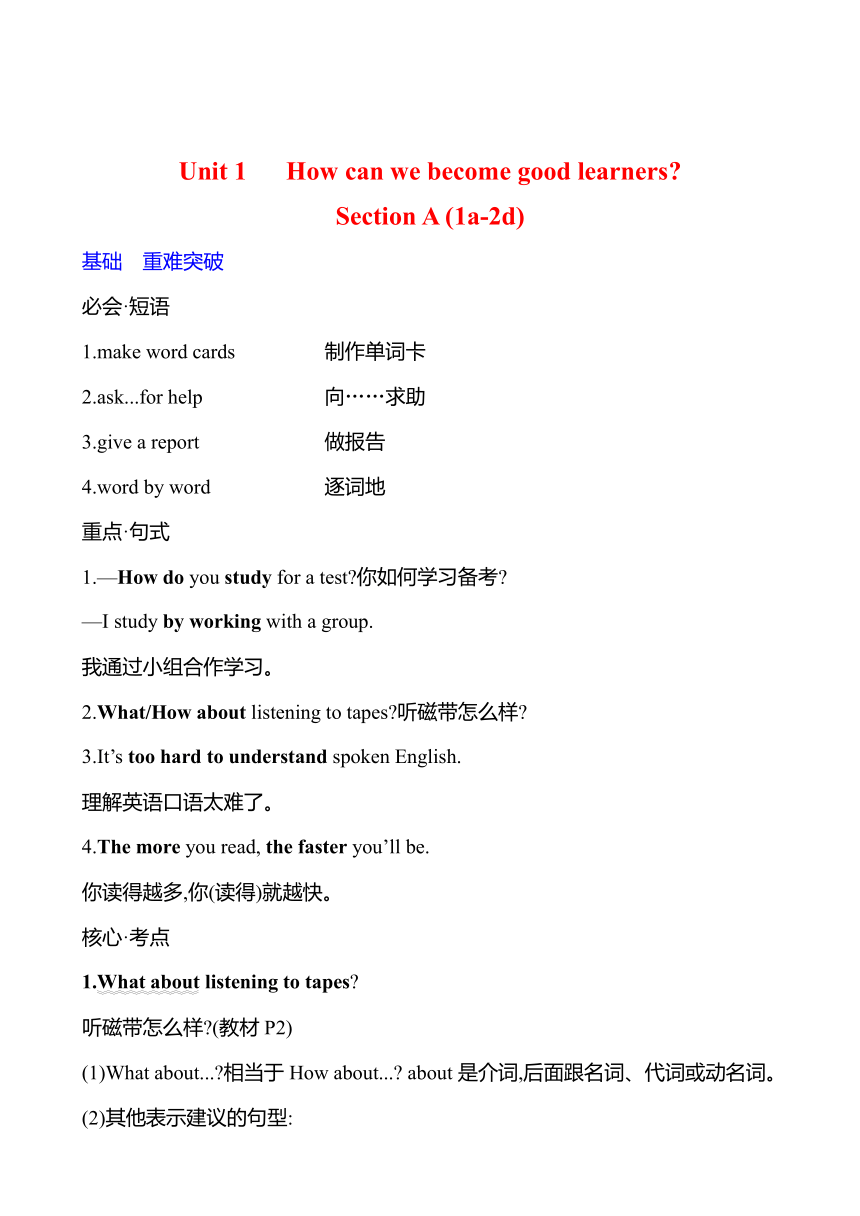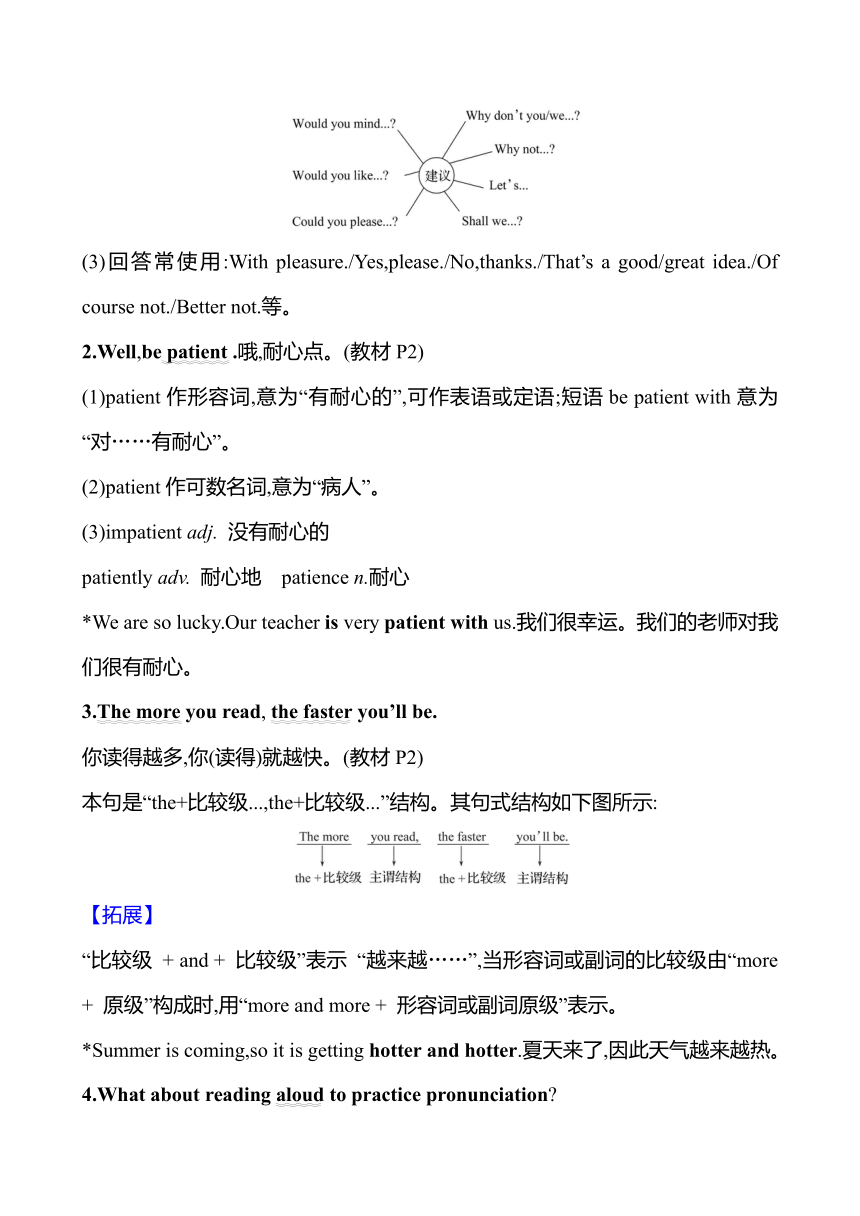Unit 1 How can we become good learners? Section A (1a-2d)学案
文档属性
| 名称 | Unit 1 How can we become good learners? Section A (1a-2d)学案 |

|
|
| 格式 | docx | ||
| 文件大小 | 64.2KB | ||
| 资源类型 | 教案 | ||
| 版本资源 | 人教新目标(Go for it)版 | ||
| 科目 | 英语 | ||
| 更新时间 | 2024-07-12 06:42:13 | ||
图片预览


文档简介
Unit 1 How can we become good learners
Section A (1a-2d)
基础 重难突破
必会·短语
1.make word cards 制作单词卡
2.ask...for help 向……求助
3.give a report 做报告
4.word by word 逐词地
重点·句式
1.—How do you study for a test 你如何学习备考
—I study by working with a group.
我通过小组合作学习。
2.What/How about listening to tapes 听磁带怎么样
3.It’s too hard to understand spoken English.
理解英语口语太难了。
4.The more you read, the faster you’ll be.
你读得越多,你(读得)就越快。
核心·考点
1.What about listening to tapes
听磁带怎么样 (教材P2)
(1)What about... 相当于How about... about是介词,后面跟名词、代词或动名词。
(2)其他表示建议的句型:
(3)回答常使用:With pleasure./Yes,please./No,thanks./That’s a good/great idea./Of course not./Better not.等。
2.Well,be patient .哦,耐心点。(教材P2)
(1)patient作形容词,意为“有耐心的”,可作表语或定语;短语be patient with意为“对……有耐心”。
(2)patient作可数名词,意为“病人”。
(3)impatient adj. 没有耐心的
patiently adv. 耐心地 patience n.耐心
*We are so lucky.Our teacher is very patient with us.我们很幸运。我们的老师对我们很有耐心。
3.The more you read, the faster you’ll be.
你读得越多,你(读得)就越快。(教材P2)
本句是“the+比较级...,the+比较级...”结构。其句式结构如下图所示:
【拓展】
“比较级 + and + 比较级”表示 “越来越……”,当形容词或副词的比较级由“more + 原级”构成时,用“more and more + 形容词或副词原级”表示。
*Summer is coming,so it is getting hotter and hotter.夏天来了,因此天气越来越热。
4.What about reading aloud to practice pronunciation
大声朗读来练习发音怎么样 (教材P2)
【辨析】 loudly,loud与aloud
考点 词性 含义及用法
loudly 副词 意为“响亮地”,与loud同义,常与ring, knock, talk等搭配,含有“喧闹,嘈杂”的意味
loud 副词 和形 容词 意为“响亮的(地);大声,高声”,侧重发出的声音大,传得远。作副词时,一般用来修饰speak, talk, laugh等动词。loud多用于比较级
aloud 副词 意为“出声地,大声地”,强调发出的声音能被听见,与read, call连用时,表示“出声”。aloud没有比较级和最高级
课时 分层演练
基础过关
Ⅰ.用括号中所给词的适当形式填空
1.We’ll repair it as quickly(quick)as possible.
2.He makes a living by planting(plant)vegetables and fruit.
3.Have you finished writing(write)your essay(文章)
4.My sister practices swimming(swim)in that pool every Sunday.
5.The more careful you are, the fewer(few)mistakes you’ll make.
Ⅱ.单项选择
(B)1.There’s a policeman over there.Let’s ask him ________help.
A.with B.for C.from
(C)2.—How could I improve my writing
—________ writing e-mails to your pen pal
A.Why not B.Let’s C.How about
(A)3.I think he is ________young ________go to school.
A.too; to B.so; to C.so; that
(C)4.—Jack,I’m not good at English.What should I do
—Why not ________an English club to practice ________English
A.to join;speaking B.join;to speak C.join;speaking
(C)5.—I’m always afraid to ask questions because of my poor ________.
—You’d better practice speaking English more.
A.introduction B.information C.pronunciation
能力提升
Ⅲ.补全对话
A:Hi, Li Lei.You look worried.What’s the matter with you
B:I have trouble in learning English.
A:Oh, you said you liked English.1.__C__
B:First, when people are speaking English, I can’t understand them.
A:2.__F__ The English club meets after school on Mondays.
B:Maybe I’ll go.Another problem is that I can’t get my pronunciation right.
A:Well.3.__A__Why don’t you listen to English songs on the radio and repeat the difficult words
B:That’s a good idea.4.__D__
A:You’d better read word groups.And you should be patient.It takes time.
B:That might really help.
A:How about your writing skills Do you get much writing practice
B:5.__B__
A:Maybe you should find a pen pal to write letters in English.
B:That sounds like a fun way.Thanks!
A.Listening can help.
B.No, I don’t think so.
C.What are the problems
D.And I am also a very slow reader.
E.Would you like to watch English movies
F.You can join an English club to talk with others.
Section A (1a-2d)
基础 重难突破
必会·短语
1.make word cards 制作单词卡
2.ask...for help 向……求助
3.give a report 做报告
4.word by word 逐词地
重点·句式
1.—How do you study for a test 你如何学习备考
—I study by working with a group.
我通过小组合作学习。
2.What/How about listening to tapes 听磁带怎么样
3.It’s too hard to understand spoken English.
理解英语口语太难了。
4.The more you read, the faster you’ll be.
你读得越多,你(读得)就越快。
核心·考点
1.What about listening to tapes
听磁带怎么样 (教材P2)
(1)What about... 相当于How about... about是介词,后面跟名词、代词或动名词。
(2)其他表示建议的句型:
(3)回答常使用:With pleasure./Yes,please./No,thanks./That’s a good/great idea./Of course not./Better not.等。
2.Well,be patient .哦,耐心点。(教材P2)
(1)patient作形容词,意为“有耐心的”,可作表语或定语;短语be patient with意为“对……有耐心”。
(2)patient作可数名词,意为“病人”。
(3)impatient adj. 没有耐心的
patiently adv. 耐心地 patience n.耐心
*We are so lucky.Our teacher is very patient with us.我们很幸运。我们的老师对我们很有耐心。
3.The more you read, the faster you’ll be.
你读得越多,你(读得)就越快。(教材P2)
本句是“the+比较级...,the+比较级...”结构。其句式结构如下图所示:
【拓展】
“比较级 + and + 比较级”表示 “越来越……”,当形容词或副词的比较级由“more + 原级”构成时,用“more and more + 形容词或副词原级”表示。
*Summer is coming,so it is getting hotter and hotter.夏天来了,因此天气越来越热。
4.What about reading aloud to practice pronunciation
大声朗读来练习发音怎么样 (教材P2)
【辨析】 loudly,loud与aloud
考点 词性 含义及用法
loudly 副词 意为“响亮地”,与loud同义,常与ring, knock, talk等搭配,含有“喧闹,嘈杂”的意味
loud 副词 和形 容词 意为“响亮的(地);大声,高声”,侧重发出的声音大,传得远。作副词时,一般用来修饰speak, talk, laugh等动词。loud多用于比较级
aloud 副词 意为“出声地,大声地”,强调发出的声音能被听见,与read, call连用时,表示“出声”。aloud没有比较级和最高级
课时 分层演练
基础过关
Ⅰ.用括号中所给词的适当形式填空
1.We’ll repair it as quickly(quick)as possible.
2.He makes a living by planting(plant)vegetables and fruit.
3.Have you finished writing(write)your essay(文章)
4.My sister practices swimming(swim)in that pool every Sunday.
5.The more careful you are, the fewer(few)mistakes you’ll make.
Ⅱ.单项选择
(B)1.There’s a policeman over there.Let’s ask him ________help.
A.with B.for C.from
(C)2.—How could I improve my writing
—________ writing e-mails to your pen pal
A.Why not B.Let’s C.How about
(A)3.I think he is ________young ________go to school.
A.too; to B.so; to C.so; that
(C)4.—Jack,I’m not good at English.What should I do
—Why not ________an English club to practice ________English
A.to join;speaking B.join;to speak C.join;speaking
(C)5.—I’m always afraid to ask questions because of my poor ________.
—You’d better practice speaking English more.
A.introduction B.information C.pronunciation
能力提升
Ⅲ.补全对话
A:Hi, Li Lei.You look worried.What’s the matter with you
B:I have trouble in learning English.
A:Oh, you said you liked English.1.__C__
B:First, when people are speaking English, I can’t understand them.
A:2.__F__ The English club meets after school on Mondays.
B:Maybe I’ll go.Another problem is that I can’t get my pronunciation right.
A:Well.3.__A__Why don’t you listen to English songs on the radio and repeat the difficult words
B:That’s a good idea.4.__D__
A:You’d better read word groups.And you should be patient.It takes time.
B:That might really help.
A:How about your writing skills Do you get much writing practice
B:5.__B__
A:Maybe you should find a pen pal to write letters in English.
B:That sounds like a fun way.Thanks!
A.Listening can help.
B.No, I don’t think so.
C.What are the problems
D.And I am also a very slow reader.
E.Would you like to watch English movies
F.You can join an English club to talk with others.
同课章节目录
- Unit 1 How can we become good learners.
- Section A
- Section B
- Unit 2 I think that mooncakes are delicious!
- Section A
- Section B
- Unit 3 Could you please tell me where the restroom
- Section A
- Section B
- Unit 4 I used to be afraid of the dark.
- Section A
- Section B
- Unit 5 What are the shirts made of?
- Section A
- Section B
- Review of Units 1-5
- Unit 6 When was it invented?
- Section A
- Section B
- Unit 7 Teenagers should be allowed to choose their
- Section A
- Section B
- Unit 8 It must belong to Carla.
- Section A
- Section B
- Unit 9 I like music that I can dance to.
- Section A
- Section B
- Unit 10 You're supposed to shake hands.
- Section A
- Section B
- Review of Units 6-10
- Unit 11 Sad movies make me cry.
- Section A
- Section B
- Unit 12 Life is full of the unexpected
- Section A
- Section B
- Unit 13 We're trying to save the earth!
- Section A
- Section B
- Unit 14 I remember meeting all of you in Grade 7.
- Section A
- Section B
- Review of Units 11-14
